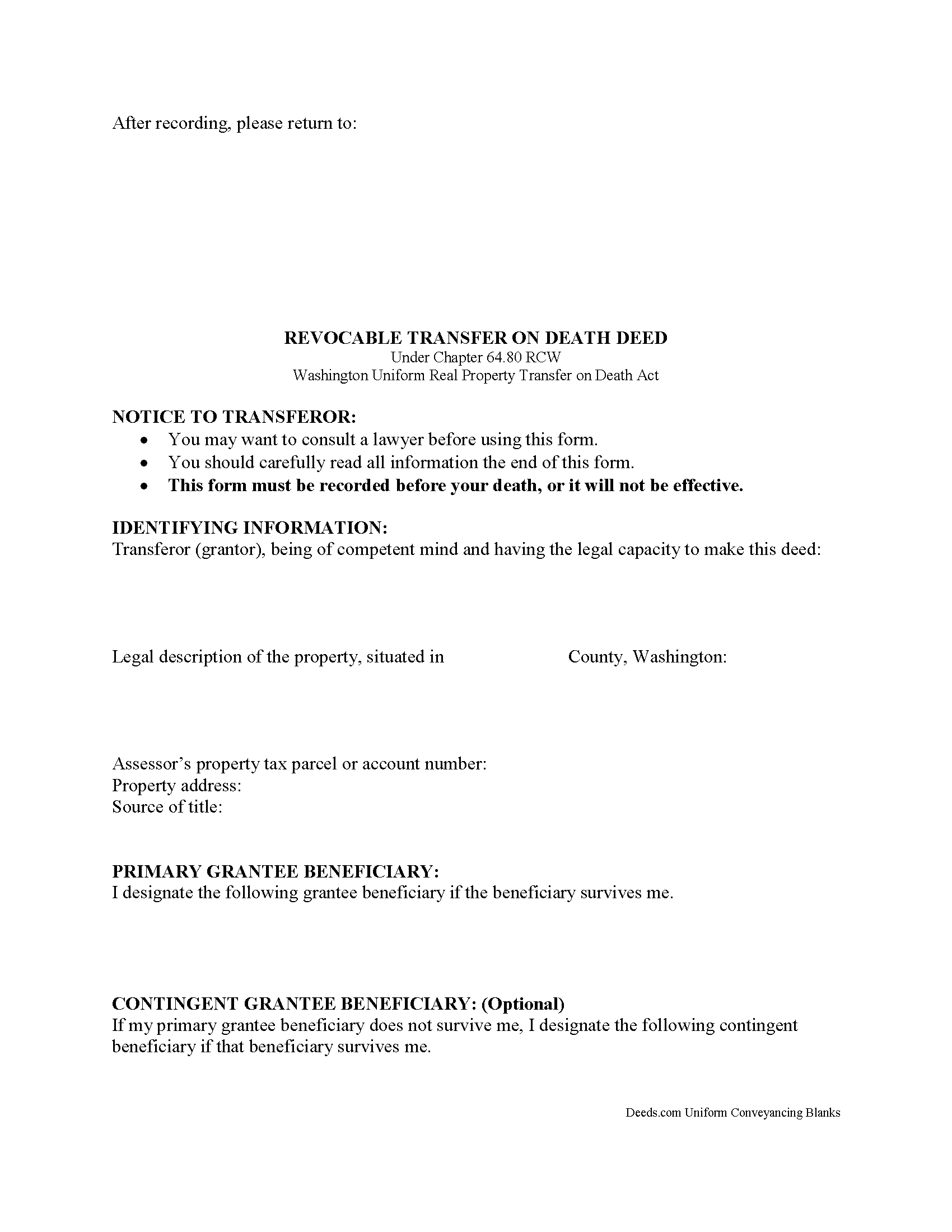Washington Transfer on Death Deed Forms

Washington Transfer on Death Deed Overview

How to Use This Form
- Select your county from the list on the left
- Download the county-specific form
- Fill in the required information
- Have the document notarized if required
- Record with your county recorder's office
Real estate owners in Washington have an estate planning option: the transfer on death deed (TODD). Find the full text in the Revised Statutes of Washington at Chapter 64.80.
This statute is based on the Uniform Real Property Transfer on Death Act (URPTODA). Along with Washington, a growing number of states are choosing to adopt the provisions of the URPTODA. The new law allows landowners to direct the distribution of what is often their most significant asset, their real estate, with a correctly executed and recorded transfer on death deed.
Transfer on death deeds are nontestamentary, which means ownership of the property passes to the beneficiary without instructions in a will or the need for probate (64.80.040). Unnecessary conflicts are likely to add confusion and expense, so best practices dictate that landholders should take care to ensure that their wills and TODDs lead to the same outcomes.
Washington's version of the URPTODA sets out the specific requirements for lawful transfer on death deeds:
- The capacity required to make or revoke a transfer on death deed is the same as the capacity required to make a will (64.80.050, 11.12.010).
- It must contain the essential elements and formalities of a properly recordable inter vivos deed, such as warranty or quitclaim deed (64.80.060(1))
- It must state that the transfer to the designated beneficiary is to occur at the transferor's death (64.80.060(2))
- It must be recorded before the transferor's death in the office of the clerk of the county commission in the county where the property is located (64.80.060(3)).
The named beneficiary gains no present rights to the property, only a potential future interest. Instead, the transferors retain absolute control during their lives. This includes the freedom to sell or transfer it to someone else, and to modify or revoke the intended transfer on death (64.80.090). These details, along with the fact that TODDs only convey the property rights remaining, if any, at the owner's death, explain why they do not require notice or consideration (64.80.070).
According to 64.80.100(1)(a), the beneficiary gains equitable interest in the property ONLY when the owner dies. Note, however, that the beneficiary must be alive at the time of the transferor's death or the interest returns to the estate (64.80.100(1)(b)). To prevent this from happening, the owner may identify one or more contingent beneficiaries. All beneficiaries take title subject to any obligations (contracts, easements, etc.) associated with the property when the transferor dies (according to 64.80.100(2)).
With the new transfer on death deeds, real property owners in Washington have access to a convenient, flexible tool for managing one aspect of a comprehensive estate plan. Even so, a TODD may not be appropriate for everyone. Since each situation is unique, contact an attorney with specific questions or for complex circumstances.
(Washington TODD Package includes form, guidelines, and completed example)
Important: County-Specific Forms
Our transfer on death deed forms are specifically formatted for each county in Washington.
After selecting your county, you'll receive forms that meet all local recording requirements, ensuring your documents will be accepted without delays or rejection fees.
How to Use This Form
- Select your county from the list above
- Download the county-specific form
- Fill in the required information
- Have the document notarized if required
- Record with your county recorder's office
Common Uses for Transfer on Death Deed
- Transfer property between family members
- Add or remove names from property titles
- Transfer property into or out of trusts
- Correct errors in previously recorded deeds
- Gift property to others